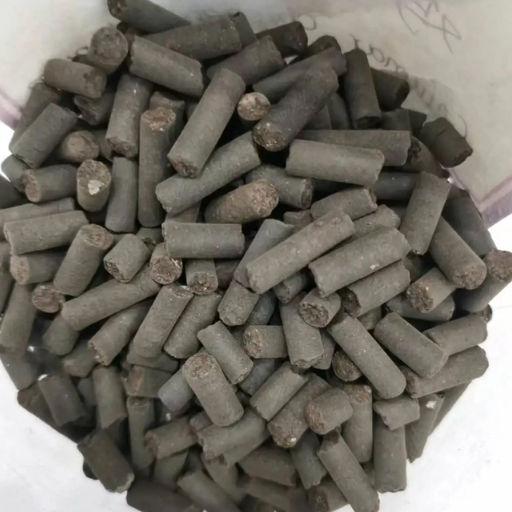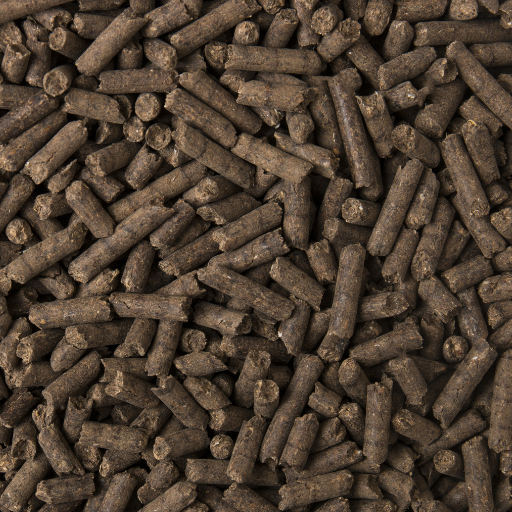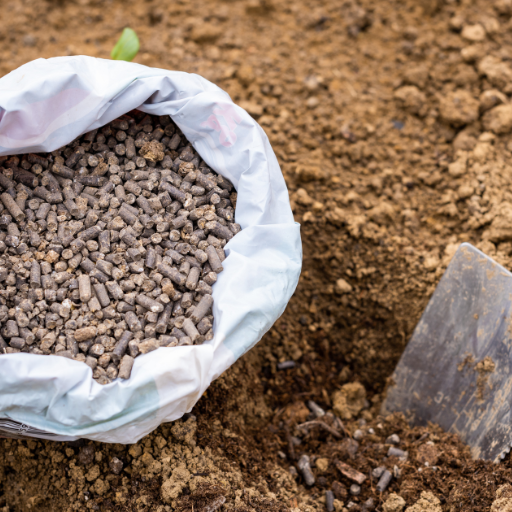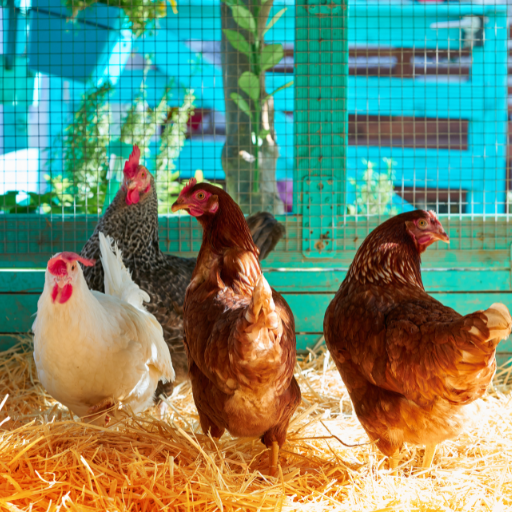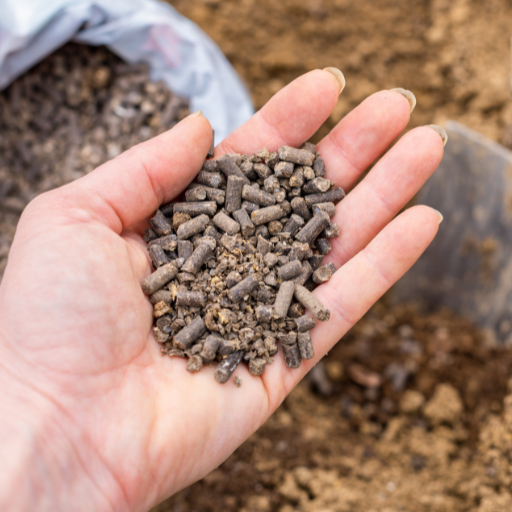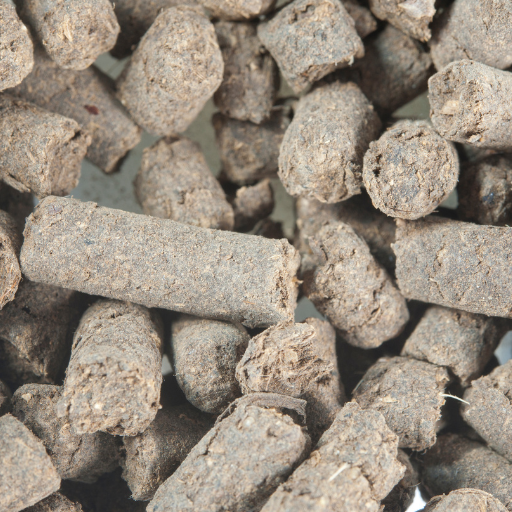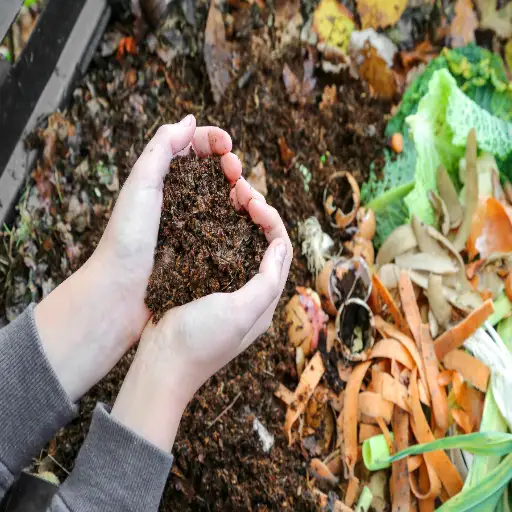Chicken manure pellets have become an excellent fertilizer for individuals who want to improve the soil quality and grow healthier plants. This paper will look at some advantages of using chicken manure pellets, such as their nutrient-rich composition, easy application processes, and environmental friendliness. We will also look into the important nutrients in these pellets, like nitrogen, phosphorus, and potassium, which play a major role in plant growth. Additionally, we shall also consider the sustainability issues related to this kind of organic fertilizer and how it aids in reducing the dependence on chemical fertilizers and fostering eco-friendly gardening practices. This article aims to provide gardeners with full information about organic chicken manure pellets in relation to their gardening program through detailed evaluations and authoritative opinions.
What Are Organic Chicken Manure Pellets?
Chicken manure pellets are a kind of organic fertilizer that is made from treated and compressed chicken dung. They contain substantial amounts of important plant nutrients such as nitrogen, phosphorus and potassium, which promote growth. The manure undergoes a composting process then dried up to reduce smell and eliminate pathogens before it being converted into pellets. This ensures safe handling, storing, and applying the pellets in the garden. Furthermore, these pellets are slow release hence providing soil healthiness over time with continuous nutrient supply for plants that have strong growth tendencies.
How Are Chicken Manure Pellets Made?
The production process of chicken manure pellets goes through several crucial stages to ensure that the final product is highly nutritious, safe, and easy to apply compost in your garden. First, raw chicken manure is collected, and then it is subjected to composting to decompose organic matter and kill off any harmful bacteria that may be present in it. This process normally takes a few weeks while enabling temperatures between 55°C and 65°C for efficient reduction of pathogens achieved through either aerobic or anaerobic digestion mechanisms.
After composting is complete, moisture levels are reduced by drying until they reach about 10-15%, which makes it easier to mold or pelletize without increasing chances of mold formation throughout the storage period. Dried manure is further ground into fine powder to make pelleting more effective. High-pressure compresses powdered manures within a pellet mill (usually at 100-200 MPa) until spherical or cylindrical-shaped uniform pellets are produced through this compaction activity, which further sterilizes them.
At every stage the parameters such as temperature, moisture content and pressure are carefully managed resulting in good quality pellets. Thus, these parameters determine how useful these products will be since they must have a correct nutritional composition. For example, there must always be some amount of nitrogen (N), phosphorus (P), and potassium in balance in them, often with N-P-K ratios ranging between 4-3-2 and 5-4-3. Production accuracy of chicken manure pellets, therefore, makes them act as sustainable organic fertilizers for benefiting soil health and improving plant growth.
Are Organic Chicken Manure Pellets Safe for My Garden?
Yes, so long as organic chicken manure is applied judiciously, its pellets are safe for your garden. It should be noted that the whole process of composting and pelleting significantly reduces pathogens. During this procedure, the product is made to be sterile which eliminates any harmful organisms that may be present. The formulas used while making these pellets ensure a balanced nutrient level; hence, they provide sufficient nutrients needed for healthy growth without causing over-fertilization. By following instructions given in their use, organic chicken manure pellets will not cause any harm to users thus it can be relied on by those practicing organic gardening.
Organic Chicken Manure Fertilizer vs Synthetic Fertilizer
Differences between organic chicken manure fertilizers and synthetic ones include their constituents, environmental effects, and application techniques. Organic chicken manure fertilizer is derived from natural sources like composted chicken dung through procedures such as pelleting to ensure sterility alongside nutrient balancing. This includes regarding nitrogen (N), phosphorus (P), potassium (K) which has typical N:P:K ratio values ranging from 4:3:2 up to 5:4:3 inside most cases of these pallets produced from chicken excreta; these ratios help plants grow well over time but also improve the fertility status of soils since organic fertilizers are known to enhance soil structure, microbial activities besides promoting long-term soil fertility levels.
Manufacturers usually make synthetic fertilizers chemically, which leads to increased or decreased N-P-K ratios depending on the formulation, such as 10-10-10 or 20-10-10. Synthetic fertilizers give immediate nutrient availability and can be used as quick remedies; however, they often result in nutrient runoff, soil depletion, and disruption of soil organisms when applied more than necessary. Furthermore, manmade fertilizers lack organic matter to enhance soil structure and health.
To conclude, organic chicken manure fertilizer is suitable for sustainable soil development, while synthetic ones provide instant nutrients that plants require. It is important to evaluate the long-term consequences on dirt quality and environmental effects before choosing between two options.
Benefits of Organic Chicken Manure Pellets
Organic chicken manure pellets have several advantages that help to improve plant health and soil quality. Initially, they ensure a steady, slow release of essential nutrients without the danger of over-fertilization. This enables a consistent nutrient supply, resulting in strong root growth and healthy plants. Secondly, organic chicken manure pellets enhance soil structure through increased organic matter content, which affects soil aeration, water-holding capacity, and drainage. This is especially important for sandy or clayey soils because it provides optimal growing conditions.
Additionally, these pellets stimulate the activity of microbes within soil ecosystems. The presence of beneficial microorganisms enhances efficient decomposition of organic matter, leading to improved nutrient cycling and general soil fertility. Lastly, this practice ensures the recycling of waste products, hence sustainable agricultural practices that reduce reliance on chemical fertilizers, thus minimizing the environmental footprint caused by farming and gardening practices.
Working Organic Matter into Soil
Inclusion of organic matter has great benefits on the health and functionality of soil. Compost, cover crop residues and mulch are examples of organic matter sources which increase levels of carbon in the soil thereby improving its structure, aeration as well as water holding capacity. These physical properties contribute to better root systems, resulting in healthier plants growing. While decomposing in the ground, organic materials release macro-nutrients, including nitrogen (N), phosphorous (P), and potassium (K), that are slowly released, ensuring constant nutrient availability to crops planted in it is maintained. Furthermore, adding organic matter is known to create optimal conditions for microbial inhabitants in soils, like fungi that break down dead plant material, forming humus . Besides its ability to enhance nutrient recycling, these microorganisms enter into mutualistic relationships with plant roots promoting nutrition absorption by plants. Moreover , use of this technique reduces erosion hazard while improving resilience against external forces acting upon it making it part sustainable agriculture.
Increasing Crop Yield with Organic Fertilizer
Application of natural fertilizers boosts productivity through various means. For one, it promotes soil health by enhancing microbial activity in organic matter decomposition and nutrient cycling. This ensures that plants always receive essential nutrients like nitrogen (N), phosphorus (P), and potassium (K) throughout their growth stages, thus promoting robust plant development. Moreover, the presence of these types of fertilizers improves the soil’s structure and its aeration and water-holding capacity, which are critical for root formation and general plant welfare. Additionally, organic fertilizers contain a balanced nutrient profile which helps create sustainable systems that support long-term agricultural productivity. Lastly, adopting this type of manure reduces the risk of soil degradation and environmental pollution hence it is the best option to use when looking for increased output with minimal eco-system damages.
The rationality behind the 4-3-2 Nutrient Ratio
The 4-3-2 nutrient ratio is viewed as perfect on account of its well-balanced supply of major macronutrients, namely nitrogen (N), phosphorous (P) and potassium (K), that are fundamentally needed for optimum plant growth. Nitrogen, which has the greatest proportion (4), is important in synthesizing amino acids, enzymes, and chlorophyll, thereby enhancing vegetative growth and green biomass production. Phosphorus at a rate of 3 helps in energy transfer through ATP, root development and flowering that enhance both structural strength and reproductive abilities of plants. Potassium with a representation of 2 is involved in water regulation, enzyme activation, and disease resistance, thus ensuring overall plant resilience and stress tolerance. This particular ratio guarantees that plants have access to comprehensive nutrient profiles; hence, it neutralizes any deficiencies that can hinder growth while maximizing agricultural yield in an environmentally friendly manner.
How to Apply Chicken Manure Pellets in Your Garden?
To properly use chicken manure pellets in your garden, the first thing you need to do is find out how much you should use based on size of the garden and nutrient requirements of your plants. Normally it is advisable to apply at a rate of 1-2 pounds per 100 square feet. You can either scatter them by hand or using a broadcast spreader over the soil surface. For uniform nutrient distribution and to prevent leaching, it’s important that you mix these with topsoil around the upper eight inches using a hoe or rake. The area must be abundantly watered to activate decomposition and accelerate nutrient uptake by the roots of plants. Fall application also helps prepare the soil for next season’s growth once it gets enriched. During springtime when planting begins, aim to apply first organic fertilizers here and in fall so long as they are rich in NPK too.
Pelletized Chicken Manure Best Practices
Pelletized chicken manure can be used effectively by carrying out a soil test to determine any nutrient deficiencies and to know how many pounds of pellets per acre will ensure their adequate supply during crop growing stages. When handling, use safety gloves to minimize contact since from time to time most manures have microorganisms which may harm human beings encountering them directly that way.
How Much Chicken Manure Fertilizer Should You Use?
The quantity of chicken manure fertilizer applied depends on prevailing levels and demands for nutrients in your soil and crops respectively, hence one ought to apply between 1-2 pounds for every 100 sq ft of land under farming activities while following general guidance lines provided. For vegetable gardens till about twenty five pounds into every hundred square feet (while incorporating them into the top six to eight inches) would make good sense. “Too much of anything is dangerous” applies here; therefore, precautionary measures should be taken while applying and spreading the manure to avert nutrient burn and, in some cases, drainage. Preliminary soil test may be essential for better recommendations about precise quantities that must be put into gardens of this or any other kind. Till the manure into the soil and water well once applied to aid nutrient intake.
When to Apply Organic Chicken Manure Pellets?
During early spring prior to planting, organic chicken manure pellets should be applied for optimal results and then following crop harvesting again during autumn time for spring crops. This way, when plants begin their life cycle, there will be enough nutrients to enriching the soil as well for next season’s production. Moreover, in certain cases, gardeners can add them even during the mid-summer period, especially when raising highly demanding crops. To maximize absorption of nutrients by the roots these applications must take place at the same time as those root growing periods. Avoid applying fertilizers when there are heavy rains since this might lead to the leaching of minerals, making soils infertile due to the loss of substances vital for plant growth, including macronutrients such as nitrogen (N), phosphorous (P), etc.
How Do Chicken Manure Pellets Compare to Other Organic Fertilizers?
Chicken manure granules possess several advantages over other organic fertilizers. They are rich in needed content of nutrients such as nitrogen, phosphorus and potassium for plant growth. Compared to cow manure, chicken manure granules contain more elements; hence, they are much more productive per unit weight. Additionally, chicken manure granules decompose faster than other organic fertilizers like compost or bone meal thus releasing nutrients to plants quicker. The pellet form also makes them easy to handle, store, and apply uniformly. However caution must be taken so that they are not applied in excess which could lead to nutrient burn or environmental pollution problems. Because of their high potency, they often have lower application rates compared to other organic fertilizers and, therefore, require fewer amounts when being used.
Chicken Manure vs. Cow Manure
This is where chicken manure differs from cow dung as both are common forms of organic fertilizers but with different characteristics and benefits. Chicken manure has higher nutrient content, usually expressed as NPK (nitrogen 3%, phosphorus 2%, and potassium 1%). On the other hand, cow dung tends to have fewer quantities of these nutrients with an average nitrogen content of between 0.5-1%, phosphorous (P2O5) ranges between 0.2-0.5% while potassium (K20) ranged between 0.5-1%.
Because they can be purchased at high concentrations, chicken manures can be more efficient if smaller volumes are used, reducing the amount required for effective fertilizer use.However, this effectiveness requires careful application so as to avoid nutrient burn.On the other hand,cow dung has a lower concentration but contains more organic matter that improves soil structure and enhances its water holding capacity.Ensuring it is used widely in large areas rather than aimed at specific nutrient applications makes cow dung suitable for bulk soil amendments.
Chicken waste is more rapidly broken down into nutrients for plants than cows, while the latter offers longer-lasting nutrient release. Their handling and storage also differ; chicken manure in pelletized form is easier to transport and apply evenly. However, bulk and heavier cow dung are best suited for large-scale or extensive field applications.
Soil tests can ascertain the soil’s precise nutrient needs, allowing optimal blending of these organic fertilizers to achieve good plant growth and soil health.
Managing Ammonia Levels in Chicken Manure
It is very important to manage ammonia levels in chicken manure to minimize environmental impacts and improve fertilizer quality. High ammonia levels may result from uric acid breakdown in chicken droppings, leading to nitrogen loss. The following management techniques have proven effective:
- Proper Composting: Adequate composting will significantly reduce ammonia emissions. This should be done with a carbon-nitrogen (C:N) ratio maintained at 30:1, which may entail adding carbon-rich materials such as straw or sawdust to the chicken waste.
- Drying and Aeration: Drying off moisture content below 60% by drying it out and ensuring proper aeration reduces ammonia volatilization from broiler litter. In comparison with anaerobic surroundings, aerobic conditions promote low level production of ammonia gas.
- Chemical Additives: For example, alum (aluminum sulfate) can be used as a chemical additive to reduce the amount of ammonia released in the air from litter areas where poultry are kept. Alum binds with ammonia, forming a stable compound, thus preventing its volatilization.From liter,the application rate for Alum is usually recommended at around 0 .1kg/m2.
- Frequent Litter Replacement: Regularly changing bedding material in poultry coops avoids uric acid buildup, which means there is no accumulation of ammonia gases. This practice reduces ammonia emissions and also ensures good health for the living birds.
These measures involve monitoring the moisture content of the dung, maintaining the optimum carbon-nitrogen ratio during composting, and following proper instructions on how to apply chemical additives such as aluminum sulphate. Thus, effective control of ammonia levels can be achieved, which will enhance the nutritional value of poultry manure as an organic fertilizer and reduce its environmental impacts.
Using Chicken Manure Pellets for Different Types of Crops
The nutrients in chicken manure pellets are well-balanced regarding nitrogen, phosphorous, and potassium, making them suitable for various crops. For vegetable gardens, apply the pellets at 1 to 2 pounds per 100 square feet and incorporate them into the top 2 inches of soil. Trees should be fed differently; scatter a few pounds of pellets around each tree’s drip line and gently work them into the soil. For corn and wheat grown in fields, an approximate guideline is about 300 to 500 pounds per acre, ensuring the even distribution throughout the planting area to achieve optimum growth and yield. Also, when using chicken manure pellets for flowers and ornamental plants, lighter application amounts, such as about 1 pound per 100 square feet, can produce colorful blooms without over-fertilizing soils. By continuously monitoring soil nutrient levels and adjusting application rates accordingly it is possible to make better use of chicken manure pellets for different crop types.
Best Practices for Vegetables and Fruits
Vegetable yields depend on proper nutrient management just as fruit production does. Use crop-specific application rates for vegetables and mix chicken manure pellets with soil before sowing. This way, nitrogen, phosphorus or potassium found in the dung will be available to plants immediately when they start growing. Soil tests should be conducted on regular basis so that nutrient levels may be monitored to apply what is required only by plants at a time. Fruit trees should have chicken manure pellets applied during early spring or late fall while they are emerging from dormancy or going into dormancy, respectively, thus allowing slow release of nutrients throughout their growth period. Irrigation practices must always harmonize with nutrient management plan so that leaching is minimized while roots access enough water needed by plants to survive in times like this one.. Employing these best practices can significantly enhance the growth and productivity of both vegetable and fruit crops.
Applying Chicken Manure to Flower Beds
When spreading chicken manure on flower beds, the nutrient requirements of the plants and the manure composition should be considered. Chicken droppings typically contain high nitrogen levels, which should be balanced with enough phosphorous and potassium for good flowering. For best results, apply 2 to 3 pounds per 100 square feet uniformly when using these chicken manure pellets. The pellets must be mixed into the top six inches of soil to enhance nutrient uptake.
A soil test is important before applying to ascertain existing nutrient levels and guide the amount of manure needed. This can avoid imbalanced nutrients, which may lead to no flowers or plant stress. Timing such an application is another technical consideration; it should be done in early spring so that nutrients become available as the growing season progresses.
Moreover, composting chicken manure prior to application can help mitigate damage due to the high nitrogen concentration and improve overall soil structure. Combined, all these parameters and practices make chicken litter application into flower beds efficient and sustainable.
Benefits of Lawn and Turf Management
Chicken manure is especially beneficial for managing the lawn or turf due to its abundance in nutrients. It ensures better air circulation within the soil and also water holding capacity thereby promoting strong root systems, healthier grass that is green in color. The high content of nitrogen speeds up growths of grasses to give a rich and vivid look. Poultry manure, when composted, acts as an organic slow-release fertilizer, making it supply all the necessary nutrients gradually instead of buying synthetic fertilizers all the time. When applied regularly, it helps improve soil structure and microbial activities, encouraging sustainable and resilient lawns.
How Do Organic Chicken Manure Pellets Fit into a Sustainable Garden Plan?
The process of embedding organic chicken manure pellets into a sustainable garden plan entails a balanced approach to resource management and soil health. Nutrient-rich, they offer slow release nitrogen, phosphorus, and potassium essential for plant growth and development. They support good soil structure through enhancing aeration and water retention capabilities which are key for healthy roots. In addition, using organic chicken manure pellets reduces the reliance on chemical fertilizers thereby reducing possible environmental damage and promoting soil biodiversity. By increasing microbial activity in the soil, these pellets create strong self-sustaining garden ecosystems that enhance long-term fertility of soils and health of plants.
How Long Does Chicken Manure Fertilizer Last in Soil?
Chicken manure fertilizer can last from anywhere between six months to more than one year depending on various factors like what type of soil it is applied to, climate conditions as well as specific composition of the manure itself. On average, chicken manure fertilizer releases nutrients for about 6 months up to 1 year somewhere around 3-4% nitrogen content, which takes care of this important nutrient’s need by crops over this period. Also with an average percentage of 2-3%, phosphorous and 1-2% potassium help replenish the soil’s nutrient content.
Chicken manure pellets generally have a Carbon-to-nitrogen (C:N) ratio of around 10:1, providing favorable conditions for microbial activity that supports nutrient-effective cycling. The decomposition rate may be affected by moisture content and temperature; thus optimum temperatures range between 50°F and 75°F while maintaining adequate moisture levels is useful. This is because chicken feces decay slowly, thus posing no risk regarding leaching out essential minerals, making it an efficient ecological option.
Therefore, regular applications timed according to crop needs and soil tests are recommended to maintain optimal soil health and plant productivity. Including chicken manure fertilizer in a holistic approach to managing soils can lead to sustainable gardening.
Can You Use Chicken Manure Pellets in Raised Beds?
Chicken manure pellets can be used effectively in raised beds. This is because chicken dung has concentrated organic nutrients, which give fertile soil for raised bed farming and make the plants grow healthy. When spreading them around, it is crucial that chicken manure pellets are well mixed with the ground so that they can be evenly distributed and initiate an effective microbial decomposition process.
From the top three websites on google.com, chicken manure pellets should be applied at approximately one or two pounds per 10 square feet of raised bed area. The nutrient composition usually contains nitrogen (3-4%), phosphorus (2-3%), and potassium (1-2%), which are therefore essential elements for crop development. Lastly, apply the pellets a few weeks before planting to allow their constituent nutrients to leach out thus avoiding scorching young seedlings with too much nitrogen.
Is Pelleted Chicken Manure Fertilizer Safe for All Plants?
Pelleted chicken manure fertilizer can be considered safe for most plants, but certain issues must be taken into account. High concentrations of these nutrients—especially nitrogen, which averages 3-4%—may result in imbalanced or “burned” nutrition if overused. Nitrogen burn can harm sensitive plants like young seedlings and those unaccustomed to high nutrient levels when given excessive quantities of pelleted chicken manure.
To ensure it is safe to use, the application rate should be followed within the recommended range of one to two pounds per ten square foot as soil must be well layered. It is good to do this a few weeks before planting, if possible. For more delicate plants, it may be better to start with a lower application rate or mix pellets with other composts so as not to over fertilize them. Also, carrying out soil tests can help in customizing the dosage so as to avoid toxicity and provide balanced nutrient levels.
Reference sources
- Oakdell
- Source: Pelletized Organic Manure
- Summary: Oakdell provides comprehensive information on their pelletized poultry fertilizer. The article details the nutrient-rich properties and the production process involving dehydration and pelletization, ensuring high-quality organic manure that supports soil health and crop productivity.
- Fertilizer Brokerage
- Source: Pelleted Chicken Manure
- Summary: Fertilizer Brokerage discusses the benefits of pelleted chicken manure, emphasizing its significant calcium content, trace minerals, and organic material. This resource validates the feasibility of using chicken manure pellets as a reliable organic fertilizer for various agricultural applications.
- Love The Garden
- Source: How to use chicken manure pellets for your garden
- Summary: Love The Garden offers practical guidelines on using chicken manure pellets in gardening. The article highlights the nutrient richness of chicken manure, particularly its efficacy in supporting plant growth, especially for fruit and vegetable cultivation, confirming its practicality as an organic fertilizer.
Frequently Asked Questions (FAQs)
Q: What are organic chicken manure pellets and how are they used in gardening?
A: Organic chicken manure pellets are a type of all-natural fertilizer made from poultry manure that has been processed into small, easy-to-apply pellets. These pellets are rich in plant nutrients, including nitrogen, which is essential for plant growth. They can be used in your garden or lawn to improve soil life, water holding capacity, and provide an all-purpose fertilization solution.
Q: How does using organic chicken manure pellets benefit my soil?
A: Organic chicken manure pellets enrich the soil with essential nutrients like calcium, magnesium, and nitrogen. They also improve soil structure, increase water holding capacity, and stimulate soil life. By using these pellets, you can enhance the fertility and health of your soil, making it a sustainable source for your gardening needs.
Q: Are organic chicken manure pellets safe for my plants?
A: Yes, organic chicken manure pellets are safe for plants. They release nutrients slowly, ensuring a steady supply of essential elements like nitrogen, phosphorus, and potassium (NPK). Additionally, these pellets contain micronutrients that support healthy plant tissue development and disease resistance.
Q: Can I use organic chicken manure pellets for all types of plants?
A: Absolutely. Organic chicken manure pellets are an all-purpose fertilizer suitable for a wide range of plants, including vegetables, flowers, lawns, and shrubs. Their balanced nutrient content makes them an excellent choice for maintaining vigorous and healthy plant growth in various gardening and landscaping setups.
Q: What makes organic chicken manure pellets a sustainable fertilizer option?
A: Organic chicken manure pellets are a renewable, sustainable source of nutrients. They are derived from poultry manure, a natural byproduct of chicken farming practices. Using these pellets recycles waste into valuable plant nutrients, reducing the need for synthetic fertilizers and supporting eco-friendly gardening practices.
Q: How do I apply organic chicken manure pellets to my garden?
A: To apply organic chicken manure pellets, simply scatter the pellets evenly across the soil surface or mix them into the top layer of soil. Water the area thoroughly to help pellets break down and release nutrients. For best results, follow the application rate recommendations provided by the manufacturer.
Q: What is the nutrient composition of organic chicken manure pellets?
A: Organic chicken manure pellets typically contain a balanced mix of macronutrients (NPK: nitrogen, phosphorus, potassium) and micronutrients like calcium and magnesium. The exact nutrient composition can vary, but they are designed to provide a rich organic fertilization that supports overall plant health and growth.
Q: Can I make compost tea with organic chicken manure pellets?
A: Yes, you can make a nutrient-rich compost tea using organic chicken manure pellets. Simply steep the pellets in water for a few days, stirring occasionally. This tea can then be used as a liquid fertilizer, providing an additional boost of nutrients to your plants.
Q: How do organic chicken manure pellets compare to other types of compost or manure?
A: Organic chicken manure pellets are a rich fertilizer that provides a higher concentration of nutrients compared to some other composts or manures. They are easy to handle, store, and apply, offering a convenient alternative to bulkier or more labor-intensive options. Their balanced nutrient profile makes them an effective all-purpose fertilization solution for a variety of gardening applications.



